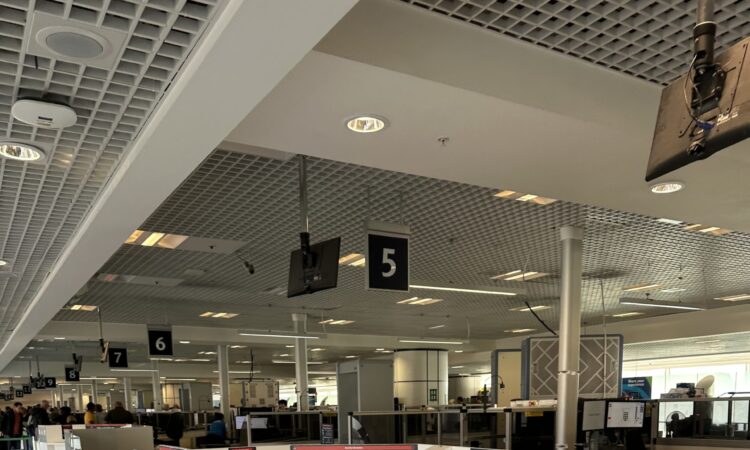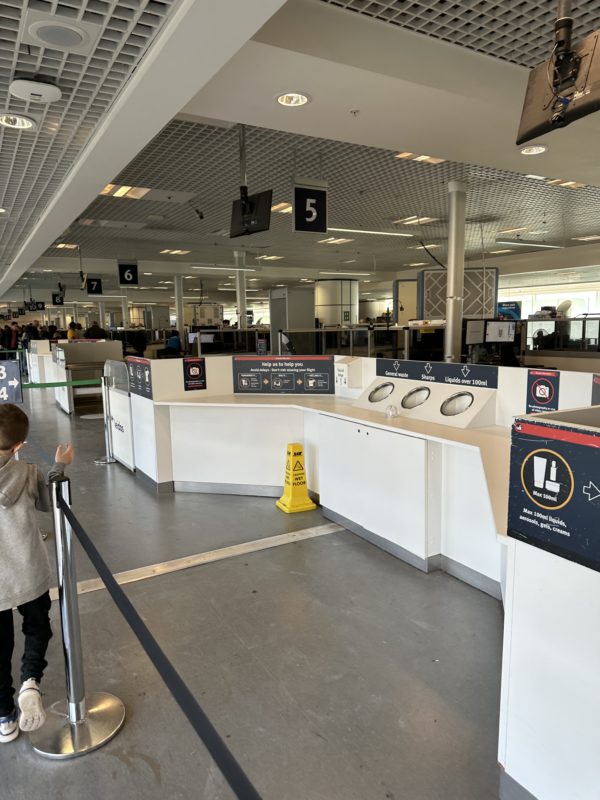
For those of you who have trouble putting liquid in bags, under 100ml each, there’s good news as the UK Government is set to change the restrictions over the next few years.

Airports such as Birmingham Airport have a long way to go, as the demand for CT-Based scanning comes into play. Image, Economy Class and Beyond.
It comes about as most major airports introduce cutting-edge systems into their security checkpoints, ushering in a new era of improved security and passenger experience when going through departures.
These are typically the CT-type scanners, which are showing up in other airports across Europe and the world.
It will mean greater convenience for travellers, as you will no longer need to spend time taking items out of their bags – but it will also enhance passenger safety, as security staff will have more detailed images of what people are carrying via the scan.
This requirement will eventually be lifted, and the 100ml liquid container limit will be extended to 2 litres.
Along with the works to enable this, the government is laying new legislation today which will make it easier to streamline the processes that apply to UK airports in the future
Racing towards 2024
Airports now have until June 2024 to upgrade their screening equipment and processes. Until then, passengers must follow the same rules as now until further notice or unless told otherwise.
The new deadline follows several trials conducted at some airports since 2018, which have demonstrated the effectiveness of this new screening equipment – which uses CT X-ray technology to essentially provide a 3D image of what’s in passengers’ bags, as well as deploying highly advanced threat detection algorithms.
Similar technology is taking place in many countries globally, with airports such as Schiphol, Geneva, Helsinki and in the US now also making use of the technology.
In Quotes
Transport Secretary Mark Harper said:
The tiny toiletry has become a staple of airport security checkpoints, but that’s all set to change. I’m streamlining cabin bag rules at airports while enhancing security.
By 2024, major airports across the UK will have the latest security tech installed, reducing queuing times, improving the passenger experience, and most importantly detecting potential threats.
Of course, this won’t happen straight away – this is going to take 2 years to be fully implemented. Until then, passengers must continue following the existing rules and check before travelling.
Christopher Snelling, Policy Director at The Airport Operators Association (AOA), said:
This investment in next-generation security by the UK’s airport operators will provide a great step forward for UK air travel, matching the best in class around the world.
It will make the journey through the UK’s airports easier and air travel itself more pleasant.
The Passenger Experience Gap
This is wonderful in theory – however, there are going to be major passenger experience gaps. As the moves by nations appear to be unilateral, rather than coordinated with other countries, you are going to introduce the one thing that makes the passenger journey through the airport less than successful – confusion.
For a long time, we have all been used to “3-1-1” or “100ml or less in a plastic baggie” for security checkpoints – and it is pretty universal.
Passengers will need to spend time checking before they travel with each airport (not just each country) to see what rules are in place.
They should also check the rules for carrying liquids at any airport through which they may transfer during their journey and at their return airport, as many destinations may not have implemented this new technology.
So you are going to quickly find passengers who have brought large amounts of liquids, finding they have to dispose of them at a transfer point or find they need to pack them quickly on their return travel.
It’s a major passenger experience gap, which will need to be filled by others to ensure that passengers can travel safely and easily.
Welcome to Economy Class and Beyond. Your no-nonsense guide to network news, honest reviews, featuring in-depth coverage, unique research, as well as the humour and madness I only know how to deliver.
Follow me on Twitter at @EconomyBeyond for the latest updates! You can follow me on Instagram too!
Also, remember that we are part of the BoardingArea community, bringing you the latest frequent flyer news from around the world.
Related






